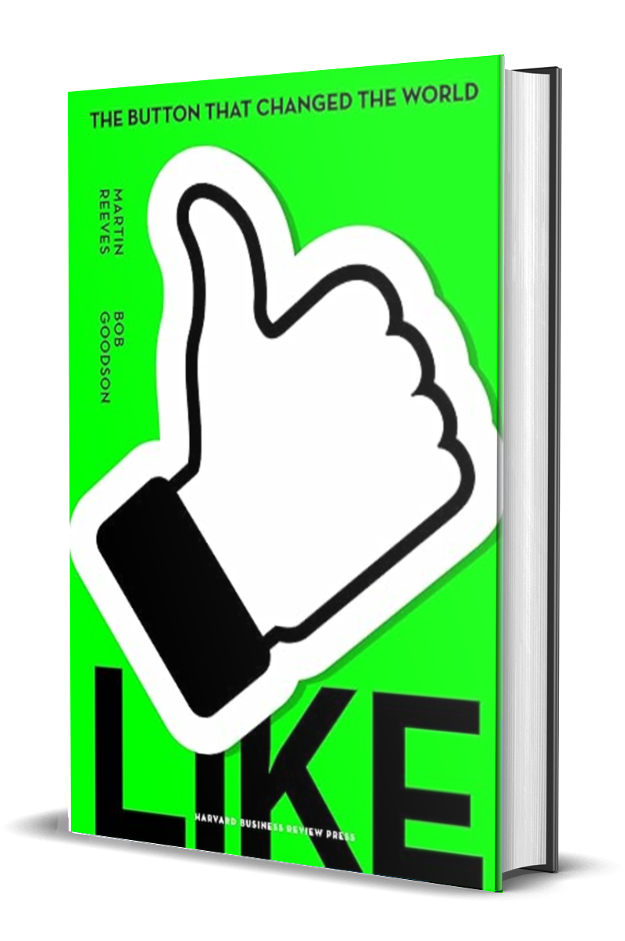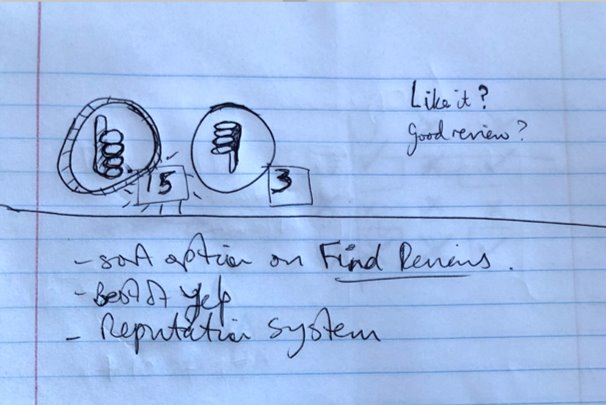
LIKE: THE BUTTON THAT CHANGED THE WORLD
A riveting, insider’s look at the creation and evolution of the like button, and what it reveals about business, technology, and innovation—and us.
PUBLISHED BY HARVARD BUSINESS REVIEW PRESS ON APRIL 29. 2025.
AMAZON | WALMART | BARNES & NOBLE | PORCHLIGHT | BOOKSHOP
Over seven billion times a day, someone taps a like button
DISCOVER THE STORY BEHIND THE LIKE BUTTON IN THE LIKE BOOK
How could something that came out of nowhere become so ubiquitous and so familiar—and even so addictive? What problem does it solve for people, and why does a “like” feel so good? And by the way, who invented the like button in the first place?
In Like, bestselling author and renowned strategist Martin Reeves and coauthor Bob Goodson—Silicon Valley veteran and participant in the invention of the like button—take readers along on a fascinating quest to find out what’s behind the world’s friendliest icon. It’s a story that starts out as simply as a thumbs-up cartoon but ends up presenting surprises and new mysteries at every turn, some of them as deep as anthropological history and others as speculative as the AI-charged future.
Learn more about the evolution of the like button by exploring the fascinating timeline of it’s invention here.
Enjoy!
Bob Goodson’s original sketch of the like button,
18th May 2005
(Source: Photo by author, courtesy of Yelp)
REVIEWS AND MEDIA
“…a fascinating and highly readable book“
Forbes
23rd June 2025
“…manages to combine journalistic details and consulting-firm frameworks in charmingly enlightening fashion“
Bloomberg
14th June 2025
“…a thoughtful, well-researched and easily accessible book…It get’s a thumbs-up.“
The Irish Times
12th June 2025
“‘Like’: The Triumph of the Thumbs-Up Icon“
Wall Street Journal
12th June 2025
“This deep dive into the invention of the button and the ramifications of this piece of code is insightful“
Washington Monthly
7th May 2025
“Like, an upbeat take on internet history by two veterans of business and technology”
The Financial Times
30th April 2025
“AI Is Using Your Likes to Get Inside Your Head”
An adapted book excerpt.
WIRED
29th April 2025
Matt Navarra – Geek Out
29th April 2025
“The future of the “like” button: Thumbs up or thumbs down?”
An adapted book excerpt.
Big Think
29th April 2025
“This is the book for you… this deeply researched book offers smart and unexpected insights into how this little icon changed our world—and all of us in the process”
The Extraordinary Business Book Newsletter
28th April 2025
“…an engrossing book by Martin Reeves and Bob Goodson”
The Times
19th April 2025
“… an entertaining new book by Martin Reeves and Bob Goodson…”
The Economist
6th March 2025
Christian Stadler writes about the Like book as a business book that is enjoyable to read and explores not preaches.
Forbes
6th March 2025
“A stimulating inquiry into the creation and consequences of the “like” button.”
Publisher’s Weekly
10th February 2025
“A riveting, insider’s look at the creation and evolution of the like button, and what it reveals about business, technology, innovation, and us.”
25 Highly Anticipated Books to Read in 2025
by the Next Big Idea Club
3rd January 2025
WATCH, LISTEN, READ LIKE
PLANET WORD EVENT – RECORDED BY C-SPAN
27TH JUNE 2025
Martin Reeves and NYT columnist Thomas Friedman in converasation at Planet Word Museum in Washington, D.C.. Watch the event recording back by C-Span book TV.
THE KARA GOLDIN SHOW
9TH JULY 2025
SIX PIXELS OF SEPARATION
6TH JULY 2025
WHAT’S NEXT! WITH TIFFANI BOVA PODCAST
26TH JUNE 2025
I by IMD BOOK CLUB WEBINAR
26TH JUNE 2025
THE BRAINY BUSINESS PODCAST
12TH JUNE 2025
MOST INNOVATIVE COMPANIES PODCAST
29TH MAY 2025
DATAFRAMED PODCAST
13TH MAY 2025
MEIKLES & DIMES PODCAST
29TH APRIL 2025
DISRUPTV PODCAST
25TH APRIL 2025
THE CEO SIGNAL – SEMAFOR BUSINESS
25TH APRIL 2025
THE BUNKER PODCAST
17TH APRIL 2025
NBC BAY AREA TV
15TH APRIL 2025
THE INTELLIGENCE BY THE ECONOMIST PODCAST
25TH MARCH 2025
FINDING GENIUS PODCAST
25TH MARCH 2025
UNIVERSITY OF EAST ANGLIA COMMUNITY BLOG
12TH MARCH 2025
ENDORSEMENTS
BIZ STONE, cofounder, Twitter
“This book isn’t just about a button—it’s a compelling journey through the messy process of innovation and a must-read for anyone curious about the hidden stories behind the things we click every day.”
BIZ STONE, cofounder, Twitter
“This book isn’t just about a button—it’s a compelling journey through the messy process of innovation and a must-read for anyone curious about the hidden stories behind the things we click every day.”
ANNA LEMBKE, MD, NYT bestselling author, Dopamine Nation
“Like is a must-read for anyone interested in how digital technology is shaping our lives and re-wiring our brains. Fascinating, fast-paced, and full of original insights, this book will open your eyes to a much richer and more textured story of the rise of social media, including where it began, how it works, and what tomorrow may bring. Two thumbs up!”
PAUL BUCHHEIT, creator, Gmail; cofounder, FriendFeed
“Like, WOW!”
W. BRIAN ARTHUR, author, The Nature of Technology
“The story of how a seemingly small innovation—the like button—was birthed, surged into prominence, and went on to change whole industries. Innovation in technology, Reeves and Goodson tell us, is by no means orderly, planned, and predictable. Rather it is disorderly, unruly, and unguided. A riveting tale.”
DAVID DE ROTHSCHILD Chairman and Trustee, Voice for Nature Foundation
“Two thumbs up! A must-read for those interested in how our individual digital interactions shape our world view.”
NIELS LUNDE, Editor in Chief, Dagbladet Børsen
“Like is wildly original. Who would have thought that such a simple button could hide a deep understanding of technology, money, and regulation? Martin Reeves shows once again that he is a unique thinker, possessing one of the most valuable human qualities: curiosity.”
AZEEM AZHAR, founder, Exponential View
“Moving from ancient Roman gestures to modern-day social media empires, Reeves and Goodson brilliantly trace how the like button became the foundation of our digital experience. It’s an essential read for anyone interested in understanding how seemingly minor innovations can reshape not just business but human interaction.”
KAI-FU LEE, coauthor, AI 2041
“Through the fascinating story of the like button, the authors show us the bigger picture of how tech innovation works, how industries are created and disrupted, and how unintended consequences arise and can be dealt with through adaptive regulation.”
RITA MCGRATH, strategist; professor at Columbia Business School
“If you’re looking for a book to ‘like’ I strongly recommend this one. It’s a can’t-put-it-down page-turner about the significance of something (and its serendipitous route into the world) you probably never appreciated. It’s full of twists, turns, interesting characters, and even biology and neuroscience. A fun and instructive read!”
GARY SHTEYNGART, bestselling author, Super Sad True Love Story
“Don’t press the like button! Buy this book instead.”
CASS R. SUNSTEIN, author, How to Become Famous
“Terrific, fun, and keenly illuminating. Reeves and Goodson tell the remarkable tale of the like button—and use it as the foundation for a host of insights into innovation, the brain, and our species.”
TIGER TYAGARAJAN, former President and CEO, Genpact
“Reeves and Goodson trace the curious origins of the like button and how it facilitated the creation of a new, multibillion dollar industry. The connections between innovation, technology, anthropology, brain science, and cultural history are fascinating. A must-read!”
KARIM R. LAKHANI, Professor at Harvard Business School; coauthor, Competing in the Age of AI
“Like is a captivating exploration of the like button’s evolution, revealing how this humble icon transformed the way people all over the world interact. A must-read for those intrigued by the power of simple innovations to influence society.”
W. BRIAN ARTHUR, author, The Nature of Technology
“The story of how a seemingly small innovation—the like button—was birthed, surged into prominence, and went on to change whole industries. Innovation in technology, Reeves and Goodson tell us, is by no means orderly, planned, and predictable. Rather it is disorderly, unruly, and unguided. A riveting tale.”
DAVID DE ROTHSCHILD Chairman and Trustee, Voice for Nature Foundation
“Two thumbs up! A must-read for those interested in how our individual digital interactions shape our world view.”
ANNA LEMBKE, MD, NYT bestselling author, Dopamine Nation
“Like is a must-read for anyone interested in how digital technology is shaping our lives and re-wiring our brains. Fascinating, fast-paced, and full of original insights, this book will open your eyes to a much richer and more textured story of the rise of social media, including where it began, how it works, and what tomorrow may bring. Two thumbs up!”
NIELS LUNDE, Editor in Chief, Dagbladet Børsen
“Like is wildly original. Who would have thought that such a simple button could hide a deep understanding of technology, money, and regulation? Martin Reeves shows once again that he is a unique thinker, possessing one of the most valuable human qualities: curiosity.”
AZEEM AZHAR, founder, Exponential View
“Moving from ancient Roman gestures to modern-day social media empires, Reeves and Goodson brilliantly trace how the like button became the foundation of our digital experience. It’s an essential read for anyone interested in understanding how seemingly minor innovations can reshape not just business but human interaction.”
KAI-FU LEE, coauthor, AI 2041
“Through the fascinating story of the like button, the authors show us the bigger picture of how tech innovation works, how industries are created and disrupted, and how unintended consequences arise and can be dealt with through adaptive regulation.”
RITA MCGRATH, strategist; professor at Columbia Business School
“If you’re looking for a book to ‘like’ I strongly recommend this one. It’s a can’t-put-it-down page-turner about the significance of something (and its serendipitous route into the world) you probably never appreciated. It’s full of twists, turns, interesting characters, and even biology and neuroscience. A fun and instructive read!”
GARY SHTEYNGART, bestselling author, Super Sad True Love Story
“Don’t press the like button! Buy this book instead.”
PAUL BUCHHEIT, creator, Gmail; cofounder, FriendFeed
“Like, WOW!”
KARIM R. LAKHANI, Professor at Harvard Business School; coauthor, Competing in the Age of AI
“Like is a captivating exploration of the like button’s evolution, revealing how this humble icon transformed the way people all over the world interact. A must-read for those intrigued by the power of simple innovations to influence society.”
BIZ STONE, cofounder, Twitter
“This book isn’t just about a button—it’s a compelling journey through the messy process of innovation and a must-read for anyone curious about the hidden stories behind the things we click every day.”
CASS R. SUNSTEIN, author, How to Become Famous
“Terrific, fun, and keenly illuminating. Reeves and Goodson tell the remarkable tale of the like button—and use it as the foundation for a host of insights into innovation, the brain, and our species.”
TIGER TYAGARAJAN, former President and CEO, Genpact
“Reeves and Goodson trace the curious origins of the like button and how it facilitated the creation of a new, multibillion dollar industry. The connections between innovation, technology, anthropology, brain science, and cultural history are fascinating. A must-read!”


